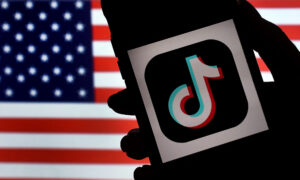
Montana has become the first U.S. state to impose a complete ban on TikTok, a Chinese-owned video-sharing platform that’s popular among both youth and adults in the United States.
Gov. Greg Gianforte signed Senate Bill 419 on Wednesday. The ban on TikTok goes into effect on Jan. 1, 2024—unless Congress passes a national law overriding it, or TikTok cuts its ties with China.
Gianforte said that it’s well-documented that the Chinese Communist Party (CCP) is “using TikTok to spy on Americans, violate their privacy, and collect their personal, private, and sensitive information.”
“Today, Montana takes the most decisive action of any state to protect Montanans’ private data and sensitive personal information from being harvested by the Chinese Communist Party,” he said in a statement.
TikTok has over 150 million American users. TikTok has said that the “vast majority” of its users are over the age of 18. The app is also wildly popular among teenagers, with the Pew Research Center saying 67 percent of U.S. teens ages 13 to 17 use TikTok, 16 percent of whom indicate they use the app almost constantly.
$10,000 for Violations
The TikTok legislation would give the Montana Department of Justice the ability to fine any “entity” such as an app store $10,000 per day if they are found responsible for giving anyone access to the app. Users wouldn’t face any penalties.
The law also prohibits app companies like Apple and Google from offering the app for download in the state.
The U.S. federal government already prohibits TikTok on government-owned devices and networks.
This also applies to nearly half of U.S. states, including Montana. Gianforte banned the app on state government devices in 2022, citing “grave security concerns” and that the use of TikTok on state devices posed a “significant risk” to sensitive state data.
The latest ban in the state extends that to personal devices, which means TikTok cannot operate at all within Montana.
The Montana House in mid-April voted 54–43 to give final approval to the measure, after it had passed the Montana Senate in early March by a vote of 30–20. The bill had bipartisan support in both chambers, which are Republican-led.
Montana Attorney General Austin Knudsen, whose office drafted the TikTok legislation, wrote on Twitter on April 14 that the ban “is a critical step to ensuring we are protecting Montanans’ privacy,” even as he acknowledged that court battles may ensue.
Looming Lawsuits
At the time when the bill passed the Montana legislature, TikTok spokesperson Brooke Oberwetter said that if the bill is signed into law, the company would mount a legal challenge over its constitutionality.
On Wednesday, Oberwetter issued another statement, saying Gianforte has signed a bill “that infringes on the First Amendment rights of the people of Montana by unlawfully banning TikTok, a platform that empowers hundreds of thousands of people across the state.”
“We want to reassure Montanans that they can continue using TikTok to express themselves, earn a living, and find community as we continue working to defend the rights of our users inside and outside of Montana.”
The American Civil Liberties Union has also said it intends to sue over alleged free speech violations.
“With this ban, Governor Gianforte and the Montana legislature have trampled on the free speech of hundreds of thousands of Montanans who use the app to express themselves, gather information, and run their small business in the name of anti-Chinese sentiment,” ACLU of Montana Policy Director Keegan Medrano said in a statement.
TikTok is working on an initiative called Project Texas, which would make a separate entity to store U.S. user data on U.S. servers, operated by Oracle, a tech company based in Texas.
National Security Concerns
TikTok is owned and operated by ByteDance, a Chinese company based in Beijing, but moved its headquarters to Singapore in 2020.
The FBI and Federal Communications Commission warned in 2022 of possible threats TikTok poses to U.S. national security, including that user data obtained by the app—such as browsing history and location—could be shared with the authoritarian Chinese regime. Concerns were heightened in late 2022 amid media reports that staff of ByteDance used the company’s access to TikTok user data to improperly track U.S. journalists.
Although TikTok once said that all U.S. user data is stored within the United States, it has also since admitted that this wasn’t true. In a September 2022 congressional hearing, TikTok executives refused to commit to stopping the flow of U.S. data to China.
“We believe the concerns driving these bans are largely fueled by misinformation about our company,” a TikTok spokesperson told The Epoch Times in an emailed statement in December 2022. “We are always happy to meet with state policymakers to discuss our privacy and security practices. We are disappointed that the many state agencies, offices, and universities that have been using TikTok to build communities and connect with constituents will no longer have access to our platform.”
TikTok rose in popularity in the United States in 2017 after ByteDance acquired Chinese-owned social media company Musical.ly and paired its Santa Monica office with TikTok. At the time, TikTok didn’t inform U.S. officials about the Musical.ly–TikTok merger despite both companies’ ties to China, independent investigative journalist Geoffrey Cain said on EpochTV’s “American Thought Leaders.”
Former President Donald Trump tried to ban new downloads of TikTok and WeChat through a Commerce Department order in 2020, but it was blocked by multiple courts, and his ban never took effect.
Casey Fleming, a cybersecurity expert and CEO of strategic advisory firm BlackOps Partners, previously told The Epoch Times, “All of your data on that phone, everything you do, and everything that you have stored on your phone is being sent out of the country, possibly to be used against you.”
In addition to national security concerns, many have raised concerns about TikTok’s content and its potential harm to the mental health of adolescents. In December 2022, the state of Indiana filed two lawsuits accusing TikTok of sending user data to the CCP and also of falsely claiming that its product was safe for children.








